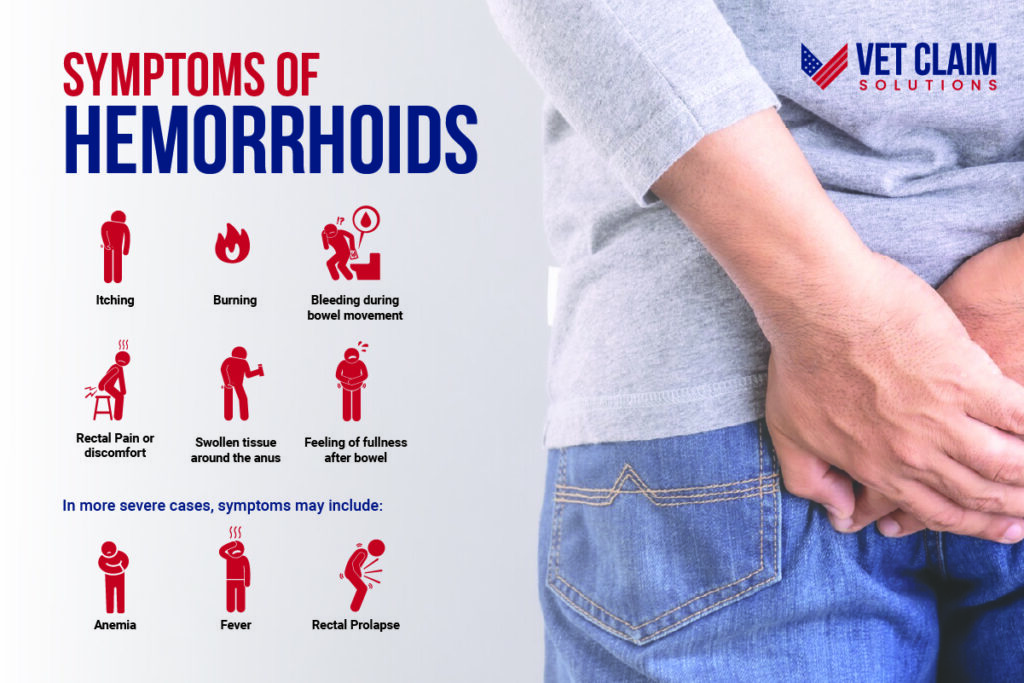Hemorrhoids can be a painful condition for many veterans, with symptoms ranging from itching and burning to bleeding. The VA provides disability ratings for veterans suffering from hemorrhoids, which are calculated based on the severity of the individual’s condition. In this blog post, we’ll discuss how the VA evaluates disability claims related to hemorrhoids and what factors play into the rating decision. Read on to learn more about VA ratings for hemorrhoids!
What Are Hemorrhoids?
A hemorrhoid is a clump of swollen veins in the rectum and anus that can cause pain, itching, or bleeding. These veins are similar to varicose veins and may appear internally or externally. Internal hemorrhoids typically cannot be seen or felt but may cause discomfort when passing stool due to straining or irritation of the surface. External hemorrhoids, on the other hand, are those under the skin around the anus. These can become irritated and cause itching or bleeding. Hemorrhoids are very common, affecting nearly three out of four adults at some point in their lives.
Symptoms of Hemorrhoids
The symptoms of hemorrhoids vary depending on the severity, type, and location. Common signs include itching, burning, bleeding during bowel movements, pain or discomfort in the rectal area, swollen tissue around the anus, and a feeling of fullness after having a bowel movement. In more severe cases, additional symptoms may include anemia, fever, and rectal prolapse.

VA Ratings for Hemorrhoids
When calculating a VA rating for hemorrhoids, the VA considers many factors in order to accurately assess the veteran’s level of disability. The primary factors taken into account include the type and severity of hemorrhoids, the presence of secondary anemia or fissures, and any evidence of frequent recurrences. Additionally, the VA may also take into consideration any additional pain or discomfort experienced by the veteran, as well as any limitations in mobility or activities of daily living.
The VA assigns disability ratings for hemorrhoids on a scale ranging from 0 to 20 percent.

This rating is assigned to veterans with persistent bleeding and secondary anemia or to those with fissures caused by hemorrhoids.

Veterans with large, thrombotic, and irreducible hemorrhoids, which cause excessive redundant tissue and frequent recurrences, may receive a rating of 10%.

Veterans who experience mild to moderate symptoms may be assigned a 0 percent rating.
In some cases, veterans may be eligible for an extraschedular rating if the rating criteria do not accurately reflect their level of disability. This means that veterans may be able to receive a higher disability rating than the schedule sets forth if they can demonstrate that their symptoms or limitations are not adequately covered by the schedular rating.
How to Establish Service Connection for Hemorrhoids
Establishing a service connection for hemorrhoids is not always a straightforward process. Many service members have experienced a delay in having their hemorrhoid condition diagnosed due to the nature of the condition and/or feeling embarrassed when discussing it with a doctor. To successfully obtain service connection for this disability, three main elements must be present:

1. A current diagnosis of the disability

2. An in-service incident that caused or aggravated the disability

3. A medical nexus that connects the condition with an in-service occurrence
Secondary Service Connection for Hemorrhoids
In some cases, service members may be able to establish a secondary service connection if their hemorrhoid condition has caused another injury or illness to form. This could include an anal infection or other serious condition. To do this, you must be able to prove the connection between the two conditions with medical evidence and show that one condition can be reasonably linked to the other.
Service Connection by Aggravation
Another way to establish a service connection for hemorrhoids is to show that a pre-existing condition was aggravated by military service. This could include a condition like irritable bowel syndrome (IBS) that was made worse by hemorrhoids, for example. In order to prove this, medical evidence must be provided that establishes a link between the two conditions and shows how military service exacerbated one or both of them.
By understanding all three ways to establish service connections for hemorrhoids and the evidence needed to support each of them, service members are more likely to receive a successful outcome for their disability claim.
Compensation and Pension Exams for Hemorrhoids
During a C&P exam for hemorrhoids, your doctor will search for any physical signs of the condition. They may assess the anal region, looking for the hardened tissue that is indicative of hemorrhoid. Depending on the severity of your case and other factors, your doctor might also suggest a colonoscopy or other imaging tests get a better understanding of your condition.
It is important to follow the instructions given by your doctor during these exams and procedures, as they are essential for gaining a proper diagnosis and medical evidence necessary to service-connect your disability. Though the procedure itself may be uncomfortable, the result can be critical in providing you with the appropriate rating and benefits. Knowing that this procedure can give you the best outcome possible may make it easier to endure.
In some cases, your doctor might also recommend lifestyle and dietary changes as part of a treatment plan. These can include increasing fiber intake, staying hydrated, exercising regularly, and avoiding certain medications or foods that could exacerbate hemorrhoid symptoms. Making these changes can not only help you feel better but can also give your doctor valuable information about the severity of your condition.
At the end of the exam, your doctor will provide you with a written report that details the results. This should include any recommended treatments and lifestyle changes to help manage your symptoms. If you have any questions or concerns about the results, it is important to address them with your doctor at this time.
Need help filling Hemorrhoids Claim?
At Vet Claim Solutions, we understand the complexity of filling out a Hemorrhoids claim. That’s why our team of experienced professionals is here to help you every step of the way. They will review your claim and provide you with all the necessary information to complete it while guiding you through the process.
We understand your time is valuable, so our team of experts will help you to make sure that your claim is filed correctly and as quickly as possible. Contact us today and let us be your partner in filing a successful Hemorrhoids claim.
Conclusion
Understanding the process of filing a VA disability claim for hemorrhoids is key to obtaining compensation and benefits. To receive a successful outcome, service members must understand the three ways to establish service connections and the evidence needed to support each one. Va disability Compensation and Pension exams are also essential in providing a proper diagnosis and necessary medical evidence.
With the help of experienced professionals from VetClaim Solutions, veterans can make sure that their claims are filed correctly and as quickly as possible. With the proper evidence and knowledgeable assistance from our team, veterans can be confident in their claim for VA disability benefits related to hemorrhoids.
FAQ’s
1. Can you get a VA rating for hemorrhoids?
Yes, it is possible to receive a VA disability rating for Hemorrhoids if you can provide sufficient medical evidence showing that your condition was caused by or aggravated during active service.
2. What causes hemorrhoids in the military?
Hemorrhoids can often be caused by physical activity such as lifting heavy objects, sitting for long periods of time, or straining during bowel movements. In addition to this, service members may be more susceptible to hemorrhoids because of their lifestyle, which includes high-stress activities and a lack of sleep.
3. How do you grade the severity of hemorrhoids?
The severity of hemorrhoids is generally graded on a scale from 1-4, with grade 4 being the most severe. Grade 1 hemorrhoids are characterized by small, swollen veins, which may cause slight itching or bleeding and can often be treated with over-the-counter medications or lifestyle changes. Grade 4 hemorrhoid cases are more serious and may require surgery or other more aggressive treatments.
4. What evidence is needed to file a claim for VA disability related to hemorrhoids?
To successfully file a claim for VA disability benefits related to hemorrhoids, service members must provide medical evidence that their condition was caused by or aggravated during active service. This can include a doctor’s diagnosis and an accurate description of the severity of the condition. In addition to this, Compensation and Pension Exams can be useful in providing the necessary medical evidence for a successful claim.
5. What is the process of filing a claim for VA disability related to hemorrhoids?
The first step in filing a claim for VA disability related to hemorrhoids is to complete and submit an application via mail or online. Once the application is received, you may be required to provide additional evidence, such as medical records and service documents. After the VA has received all of the necessary documents, a rating decision will be made, and you will receive a notice in the mail. If your claim is approved, you can begin receiving disability benefits related to hemorrhoids.


